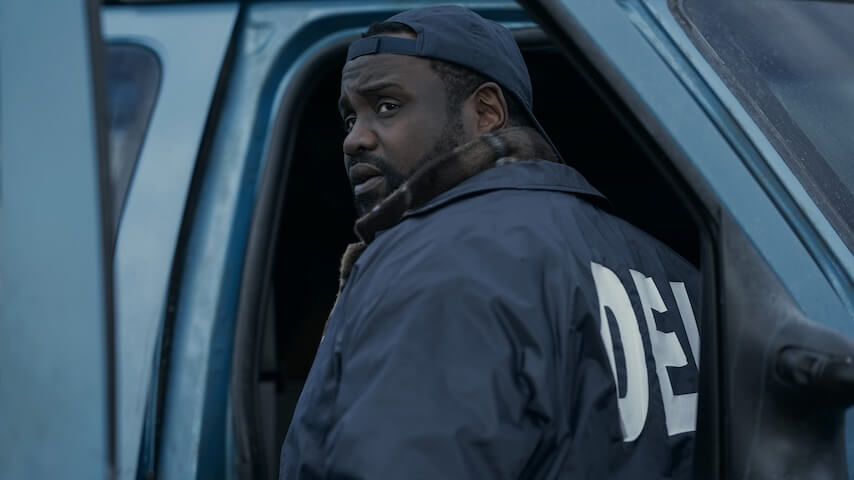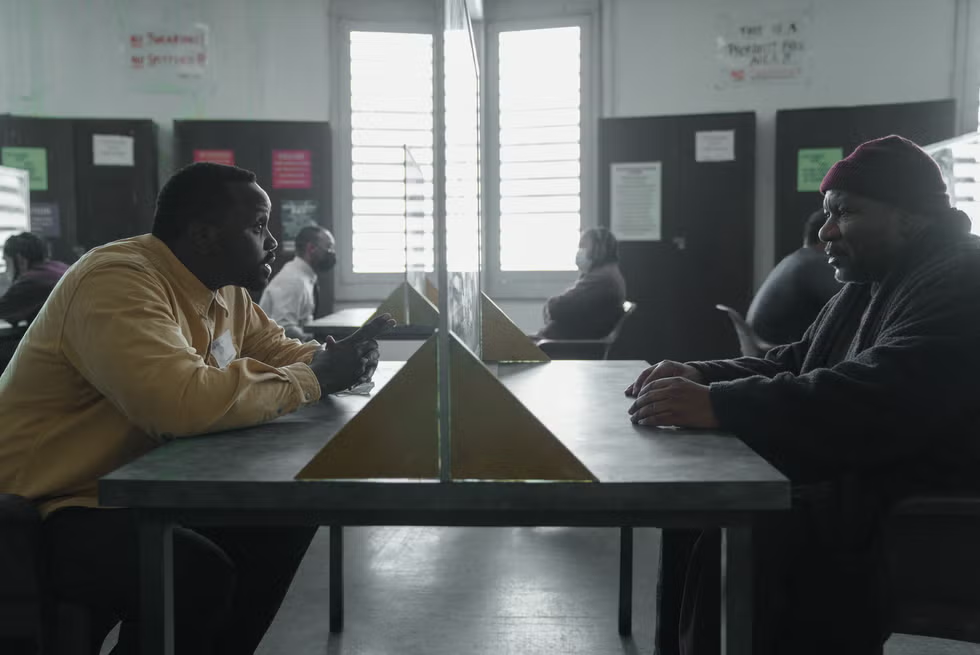Brian Tyree Henry doesn’t just act—he brings his whole self to the work. And in episode six of Dope Thief, that meant confronting years of unresolved pain with his father.
When Brian sat down with Chris Witherspoon at PopViewers’ Vibes and Views event, things got personal fast. Chris shared that he’d lost his own father in 2017, before he had the chance to say goodbye. That opened the door for the Emmy and Oscar nominated actor to talk about what made filming episode six so emotional.
Betting on Himself—Even on a $300 Paycheck
The story starts way before Dope Thief. After graduating from the Yale School of Drama, Brian moved to New York City with nothing but talent, training, and grit. His first gig? A role in Shakespeare in the Park at The Public Theater. It paid $300 a week.
“I loved it,” Brian said. “It was Shakespeare in the Park, and I was fighting Oscar Isaac in the water every day. It was beautiful—and I was a starving artist.”
He found a place to live in Sheepshead Bay, Brooklyn—not exactly close to the Delacorte Theater. “Big ups to Sheepshead Bay, but I don’t think I even knew where that was at the time,” he laughed. His commute was a beast: walking 25 minutes to a bus that wasn’t always reliable, navigating the B and Q trains, and living past Avenue Z.
“But I loved it, man,” he said. “I remember getting an EBT card, going to Western Beef on Mondays. I had to do what I had to do. That was the skinniest I’ve ever been—The EBT diet!”
What could’ve felt like struggle was, for Brian, part of a bigger mission: “I was following my dream. I was doing what I wanted to do. I was happy—very happy. And I always remind myself of those moments.”
From Sheepshead Bay to Center Stage
Brian credits the city—and the people in it—for giving him the space to grow into the artist he is today. “I cut my teeth in this city,” he said. “The community I had here is why I’m still standing.”
Part of that support came from a manager he connected with early in his career. “I found one of the best managers, someone who’s held a vision for me since I was 27 years old,” he said. “That made all the difference.”
Still, the hustle was real. “I remember choosing between spending money on printer toner for my audition sides or swiping my MetroCard,” he said. “That was the life. I don’t ever want to forget what it took to get here.”
Let Go or Be Dragged: The Lesson That Took the Longest
When asked what life lesson took him the longest to learn, Brian didn’t hesitate. “Oh, come on,” he said, with a knowing smile. “It’s letting go.”
He shared a mantra his late mother used to say: Let go or be dragged.
“As I’ve gotten older, I truly understand what that means,” he explained. “We spend so much time holding on to things that don’t serve us. But if you hold on to something that’s moving forward, eventually it’s just going to drag you behind it.”
That idea—of choosing to release what’s no longer helping you—is something he’s still mastering. “It’ll serve you to just let go,” he said. “Quitting isn’t always a bad idea. For me, it’s truly about the letting go. I refuse to be dragged by anything anymore.”
A Father’s Legacy and the Power of Timing
Back to Dope Thief, and the episode that turned into more than just acting. During the actors’ and writers’ strike in 2023, Brian chose to stay in Philadelphia while production was paused. “I could’ve left, but something in me said to stay,” he said. As an executive producer on the show, he wanted to be present for the crew. What he didn’t expect was how staying would impact him personally.

During that time, Brian was in therapy, working through years of complicated feelings about his father, Marion Henry Jr. “My father was angry,” he said. “I didn’t turn out to be the son he wanted.”
Even so, Brian loved him. That therapy—along with time, distance, and reflection—started to give Brian clarity. Then, just as production was about to resume, his sister called.
“Your dad’s gone,” she said.
Brian returned to Fayetteville, North Carolina, for the first time in nearly a decade. There, in the home he grew up in, he found a shrine. Photos of Brian—on the Oscars red carpet, in character, even as a Marvel Happy Meal toy—lined the walls. “This is how we left it,” he said. “But who am I now?”
The anger that had defined their relationship suddenly had nowhere to go.
Then life, as it often does, handed Brian the exact scene he needed to play. The first episode back? A confrontation between Ray, Brian’s character, and his father, played by Ving Rhames.

“If we hadn’t gone on strike, that episode would’ve already been shot,” Brian said. “But it wasn’t. It waited for me.”
That’s the kind of synchronicity Brian pays attention to. “I’ve been so blessed,” he said. “These roles, these moments—they choose me.”
Brian didn’t just act in that episode. He healed in it. And maybe that’s why it resonates so deeply.
Because when Brian Tyree Henry shares his truth, it’s not just for the camera—it’s for anyone still fighting for their dream, still healing from their past, and still learning how to let go.
